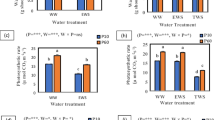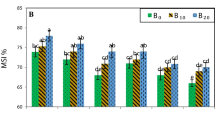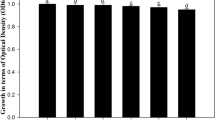Abstract
Drought stress has a negative impact on crop growth and productivity worldwide. Plant symbionts such as arbuscular mycorrhizal fungi (AMF) can enhance plant growth and improve plant resistance to drought stress. AMF mixture inocula and plant responses to drought still require further study. The objective of this study was to investigate the effects of non-inoculation (NM) or inoculation with three commercial AMF inocula containing a single or mixtures comprising different numbers of AMF species: M1 (Rhizophagus intraradices), M2 (Rhizophagus clarus, R. intraradices, Septoglomus deserticola, Funneliformis mosseae), and M3 (Rhizophagus intraradices, R. aggregatum, Funneliformis mosseae, Olaroideoglomus etunicatum) on growth, nutritional, and physiological responses of soybean (Glycine max L. cv. Hutcheson) grown in a greenhouse under different water stress levels [WW = well watered (90% FC), MS = medium (60% FC) and SS = severe stressed (30% FC)]. The AMF-inoculated plants had significantly higher plant biomass, chlorophyll content, stomatal conductance, leaf water relations, and mineral contents in comparison to NM plants. Applied mycorrhizal inocula differed in their response to water-deficit conditions. M2 inoculant generally supported greater plant biomass, stomatal conductance, leaf water content, and leaf N, P, K, S, Mn, and Cu contents than M1 and M3 inocula, especially under MS and SS treatments. These results indicated that all mycorrhizal inocula supported plant growth both generally and with soil water deficit; however, M2-inoculated plants performed better than M1 and M3 under drought stress. Therefore, mycorrhizal inocula are effective for supporting soybean growth and offsetting the effects of drought and AMF technology that can support sustainable crop cultivation under soil water-deficit conditions. Different types of inocula have different effects, however, and thus require testing for individual crops.
Similar content being viewed by others
References
Abbott LK, Robson AD (1982) The role of vesicular-arbuscular mycorrhizal fungi in agriculture and the selection of fungi for inoculation. Aus J Agric Res 33:389–408. https://doi.org/10.1071/AR9820389
Abdel-Fattah GM, Ibrahim AH, Al-Amri SM, Shoker AE (2013) Synergistic effect of arbuscular mycorrhizal fungi and spermine on amelioration of salinity stress of wheat (Triticum aestivum L. cv. Gimiza). Aus J Crop Sci 7:1525–1532
Abdel-Salam E, Alatar A, El-Sheikh MA (2018) Inoculation with arbuscular mycorrhizal fungi alleviates harmful effects of drought stress on damask Rose. Saudi J Biol Sci 25(8):1772–1780. https://doi.org/10.1016/j.sjbs.2017.10.015
Al-Karaki GN (2000) Growth of mycorrhizal tomato and mineral acquisition under salt stress. Mycorrhiza 10(2):51–54. https://doi.org/10.1007/s005720000055
Al-Karaki GN, Al-Raddad A (1997) Effects of arbuscular mycorrhizal fungi and drought stress on growth and nutrient uptake of two wheat genotypes differing in drought resistance. Mycorrhiza 7:83–88. https://doi.org/10.1007/s005720050166
Al-Karaki GN, Al-Raddad A, Clark RB (1998) Water stress and mycorrhizal isolate effects on growth, nutrient acquisition of wheat. J Plant Nutr 21(5):891–902. https://doi.org/10.1080/01904169809365451
Al-Karaki G, McMichael B, Zak J (2004) Field response of wheat to arbuscular mycorrhizal fungi and drought stress. Mycorrhiza 14(4):263–269. https://doi.org/10.1007/s00572-003-0265-2
Asrar WA, Elhindi KM (2011) Alleviation of drought stress of marigold (Tagetes erecta) plants by using arbuscular mycorrhizal fungi. Saudi J Biol Sci 18(1):93–98. https://doi.org/10.1016/j.sjbs.2010.06.007
Augé RM, Toler HD, Saxton AM (2015) Arbuscular mycorrhizal symbiosis alters stomatal conductance of host plants more under drought than under amply watered conditions: a meta-analysis. Mycorrhiza 25(1):13–24. https://doi.org/10.1007/s00572-014-0585-4
Biermann BJ, Linderman RG (1981) Increased geranium growth using pre-transplant inoculation with a mycorrhizal fungus. J Am Soc Hort Sci 108(6):972–976
Chakraborty U, Chakraborty B, Sarkar J (2017) Amelioration of abiotic stresses in plants through multi-faceted beneficial microorganisms. In: Kashyap PL, Srivastava AK, Tiwari SP, Kumar S (eds) Microbes for climate resilient agriculture. Wiley-Blackwell, pp 105–147. https://doi.org/10.1002/9781119276050.ch6
Crossay T, Cilia A, Cavaloc Y, Amir H, Redecker D (2018) Four new species of arbuscular mycorrhizal fungi (Glomeromycota) associated with endemic plants from ultramafic soils of New Caledonia. Mycol Progress 17:1–16. https://doi.org/10.1007/s11557-018-1386-5
Crossay T, Majorel C, Redecker D, Gensous S, Medevielle V, Durrieu G, Cavaloc Y, Amir H (2019) Is a mixture of arbuscular mycorrhizal fungi better for plant growth than single-species inoculants? Mycorrhiza 29:325–339. https://doi.org/10.1007/s00572-019-00898-y
Daei G, Ardekani MR, Rejali F, Teimuri S, Miransari M (2009) Alleviation of salinity stress on wheat yield, yield components, and nutrient uptake using arbuscular mycorrhizal fungi under field conditions. J Plant Physiol 166(6):617–625. https://doi.org/10.1016/j.jplph.2008.09.013
Davies FT Jr, Potter JR, Linderman RG (1992) Mycorrhiza and repeated drought exposure affect drought resistance and extraradical hyphae development on pepper plants independent of plant size and nutrient content. J Plant Physiol 139(3):289–294. https://doi.org/10.1016/S0176-1617(11)80339-1
Davies FT, Potter J, Linderman RG (1993) Drought resistance of mycorrhizal pepper plants independent of leaf P-concentration—response in gas exchange and water relations. Physiol Plant 87(1):45–53. https://doi.org/10.1111/j.1399-3054.1993.tb08789.x
Evelin H, Giri B, Kapoor R (2012) Contribution of Glomus intraradices inoculation to nutrient acquisition and mitigation of ionic imbalance in NaCl stressed Trigonella foenum-graecum. Mycorrhiza 22(3):203–217. https://doi.org/10.1007/s00572-011-0392-0
Fahad S, Bajwa AA, Nazir U, Anjum SA, Farooq A, Zohaib A (2017) Crop production under drought and heat stress: plant responses and management options. Front Plant Sci 8:1147. https://doi.org/10.3389/fpls.2017.01147
Faye A, Dalpe Y, Ndung’u-Magiroi K, Jefwa J, Ndoye I, Diouf M, Lesueur D (2013) Evaluation of commercial arbuscular mycorrhizal inoculants. Can J Plant Sci 93(6):1201–1208. https://doi.org/10.4141/cjps2013-326
Fuganti-Pagliarini R, Ferreira LC, Rodrigues FA, Molinari HB, Marin SR, Molinari MD, Marcolino-Gomes J, Mertz-Henning LM, Farias JR, de Oliveira MC, Neumaier N (2017) Characterization of soybean genetically modified for drought tolerance in field conditions. Front Plant Sci 8:448. https://doi.org/10.3389/fpls.2017.00448
García AN, Árias SPB, Morte A, Sánchez-Blanco MJ (2011) Effects of nursery preconditioning through mycorrhizal inoculation and drought in Arbutus unedo L. plants. Mycorrhiza 21(1):53–64. https://doi.org/10.1007/s00572-010-0310-x
Gong MG, Tang M, Chen H (2013) Effects of two Glomus species on the growth and physiological performance of Sophordavidii seedlings under water stress. New For 44(3):399–408. https://doi.org/10.1007/s11056-012-9349-1
Grümberg BC, Urcelay C, Shroeder MA, Vargas-Gil S, Luna CM (2015) The role of inoculum identity in drought stress mitigation by arbuscular mycorrhizal fungi in soybean. Biol Fert Soil 51(1):1–10. https://doi.org/10.1007/s00374-014-0942-7
Hashem A, Kumarc A, Al-Dbassd AM, Alqarawie AA, Al-Arjania A, Singh G, Farooq G, Allahea EFA (2019) Arbuscular mycorrhizal fungi and biochar improves drought tolerance in chickpea. Saudi J Biol Sci 26(3):614–624. https://doi.org/10.1016/j.sjbs.2018.11.005
Jansa J, Smith FA, Smith SE (2007) Are there benefits of simultaneous root colonization by different arbuscular mycorrhizal fungi? New Phytol 177:779–789. https://doi.org/10.1111/j.1469-8137.2007.02294.x
Kahil MT, Dinar A, Albiac J (2015) Modelling water scarcity and droughts for policy adaptation to climate change in arid and semiarid regions. J Hydrol 522:95–109. https://doi.org/10.1016/j.jhydrol.2014.12.042
Knight SL, Rogers RB, Smith MAL, Spomer LA (1992) Effects of NaCl salinity on miniature dwarf tomato “Micro-Tom”: I. Growth analysis and nutrient composition. J Plant Nutr 15:2315–2327. https://doi.org/10.1080/01904169209364476
Liu T, Sheng M, Wang CY, Chen H, Li Z, Tang M (2015) Impact of arbuscular mycorrhizal fungi on the growth, water status, and photosynthesis of hybrid poplar under drought stress and recovery. Photosynthetica 53:250–258. https://doi.org/10.1007/s11099-015-0100-y
Liu H, Song F, Liu S, Li X, Liu F, Zhu X (2019) Arbuscular mycorrhiza improves nitrogen use efficiency in soybean grown under partial root-zone drying irrigation. Archives Agron Soil Sci 65:269–279. https://doi.org/10.1080/03650340.2018.1493724
Miransari M (2010) Contribution of arbuscular mycorrhizal symbiosis to plant growth under different types of soil stress. Plant Biol 12:563–569. https://doi.org/10.1111/j.1438-8677.2009.00308.x
Munkvold L, Kjøller R, Vestberg M, Rosendahl S, Jakobsen I (2004) High functional diversity within species of arbuscular mycorrhizal fungi. New Phytol 164:357–364
Nasaruddin RI (2018) Photosynthetic apparatus of soybean exposed to drought due to application of arbuscular mycorrhiza. Asian J Plant Sci 17:37–46. https://doi.org/10.3923/ajps.2018.37.46
Navarro A, Sánchez-Blanco MJ, Morte A, Bañón S (2009) The influence of mycorrhizal infection on water and nutritional status of Arbutus unedo treated and not treated with paclobutrazol. Environ Exp Botany 66:362–371. https://doi.org/10.1016/j.envexpbot.2009.04.005
Paetsch L, Mueller CW, Kögel-Knabner I, Von Lützow M, Girardin C, Rumpel C (2018) Effect of in-situ aged and fresh biochar on soil hydraulic conditions and microbial C use under drought conditions. Sci Rep 8:6852. https://doi.org/10.1038/s41598-018-25039-x
Phillips J, Hayman D (1970) Improved procedures for clearing roots and staining parasitic and vesicular-arbuscular mycorrhizal fungi for rapid assessment of infection. Trans Br Mycol Soc 55:158-IN18. https://doi.org/10.1016/S0007-1536(70)80110-3
Porcel R, Ruiz-Lozano JM (2004) Arbuscular mycorrhizal influence on leaf water potential, solute accumulation, and oxidative stress in soybean plants subjected to drought stress. J Exp Bot 55(403):1743–1750. https://doi.org/10.1093/jxb/erh188
Rapparini F, Peñuelas J (2014) Mycorrhizal fungi to alleviate drought stress on plant growth. In: Use of microbes for the alleviation of soil stresses, vol 1. Springer, pp 21–42. https://doi.org/10.1007/978-1-4614-9466-9_2.
Razaq M, Salahuddin SHL, Sher H, Zhang P (2017) Influence of biochar and nitrogen on fine root morphology, physiology, and chemistry of Acer Mono. Sci Rep 7:5367. https://doi.org/10.1038/s41598-017-05721-2
Ruiz-Lozano JM (2003) Arbuscular mycorrhizal symbiosis and alleviation of osmotic stress. New perspectives for molecular studies. Mycorrhiza 13:309–317. https://doi.org/10.1007/s00572-003-0237-6
Ruiz-Lozano JM, Aroca R (2010) Host response to osmotic stresses: stomatal behavior and water use efficiency or arbuscular mycorrhizal plants. In: Arbuscular mycorrhizas: physiology and function. Springer, pp 239–256. https://doi.org/10.1007/978-90-481-9489-6_11.
Shamshiri MH, Fattahi M (2016) Effects of arbuscular mycorrhizal fungi on photosystem II activity of three pistachio rootstocks under salt stress as probed by the OJIP-test. Russ J Plant Physiol 63:101–110. https://doi.org/10.1134/S1021443716010155
Sinclair TR, Purcell LC, King CA, Sneller CH, Chen P, Vadez V (2007) Drought tolerance and yield increase of soybean resulting from improved symbiotic N2 fixation. Field Crop Res 101(1):68–71. https://doi.org/10.1016/j.fcr.2006.09.010
Tarbell TJ, Koske RE (2007) Evaluation of commercial arbuscular mycorrhizal inocula in a sand/peat medium. Mycorrhiza 18:51–56. https://doi.org/10.1007/s00572-007-0152-3
Thirkell TJ, Charters MD, Elliott AJ, Sait SM, Field KJ (2017) Are mycorrhizal fungi our sustainable saviours? Considerations for achieving food security. J Ecol 105:921–929. https://doi.org/10.1111/1365-2745.12788
Wang Y, Wang M, Li Y, Wu A, Huang J (2018) Effects of arbuscular mycorrhizal fungi on growth and nitrogen uptake of Chrysanthemum morifolium under salt stress. PLoS ONE 13(4):e0196408. https://doi.org/10.1371/journal.pone.0196408
Wu QS, Srivastava AK, Zou YN (2013) AMF-induced tolerance to drought stress in citrus: a review. Sci Hortic 164:77–87. https://doi.org/10.1016/j.scienta.2013.09.010
Zhu XQ, Wang CY, Chen H, Tang M (2014) Effects of arbuscular mycorrhizal fungi on photosynthesis, carbon content, and calorific value of black locust seedlings. Photosynthetica 52:247–252. https://doi.org/10.1007/s11099-014-0031-z
Acknowledgements
The senior author would like to thank Fulbright program (Jordan) for supporting him with a scholarship during this research. Support from the Virginia Soybean Board was also critical in the completion of this research. Both authors acknowledge the aid of Mrs. Kerri Mills for her help in the greenhouse and lab, and Dr. Greg Welbaum, and Dr Tony Wolf for their gracious help with the use of equipment in this study.
Author information
Authors and Affiliations
Corresponding author
Ethics declarations
Conflict of interest
The authors declare that they have no conflict of interest.
Additional information
Communicated by O. Ferrarese-Filho.
Publisher's Note
Springer Nature remains neutral with regard to jurisdictional claims in published maps and institutional affiliations.
Rights and permissions
About this article
Cite this article
Al-Karaki, G.N., Williams, M. Mycorrhizal mixtures affect the growth, nutrition, and physiological responses of soybean to water deficit. Acta Physiol Plant 43, 75 (2021). https://doi.org/10.1007/s11738-021-03250-0
Received:
Revised:
Accepted:
Published:
DOI: https://doi.org/10.1007/s11738-021-03250-0




